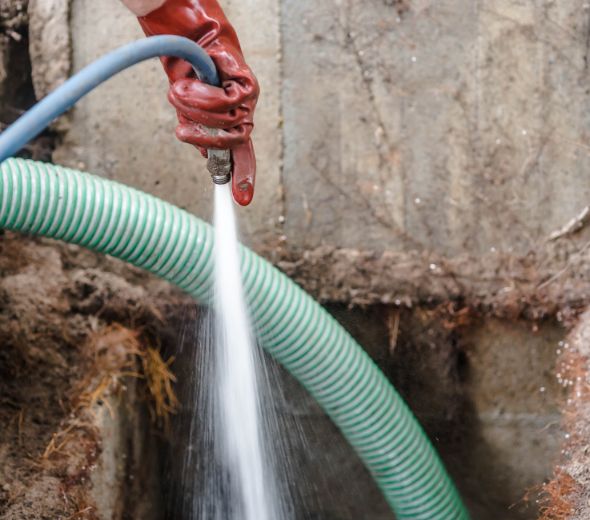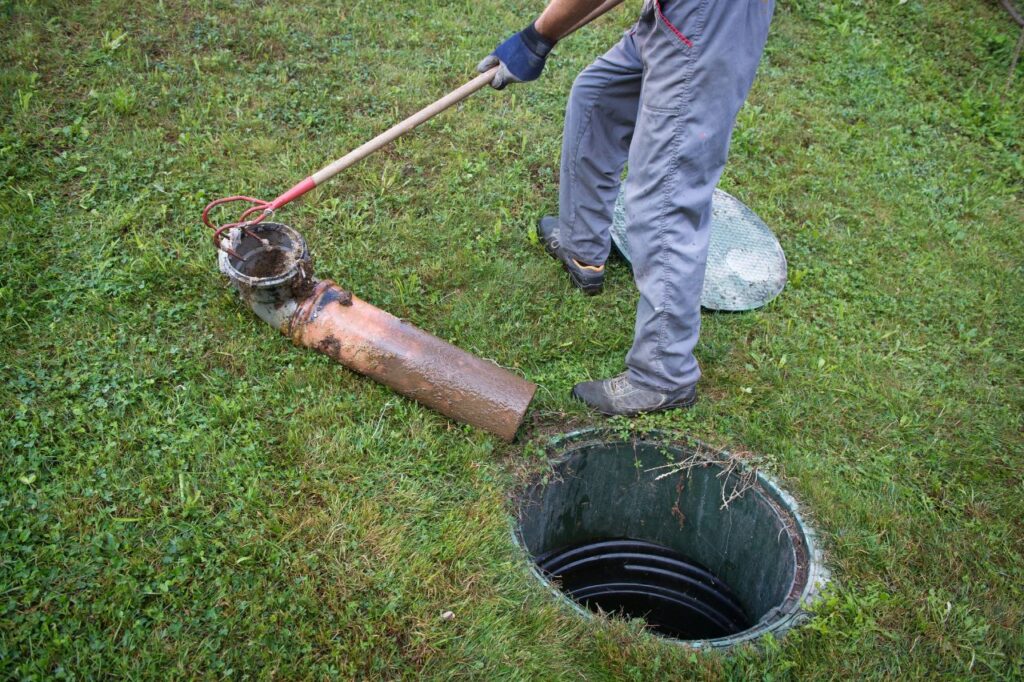What is a Septic Tank?
In places that don’t have access to a sewer system, septic systems are a cost-effective and environmentally friendly way to get rid of wastewater. Most of these systems have a septic tank, where large and small pieces of solid waste settle out of the wastewater, and a drain field, where liquid waste soaks up into the soil. Septic systems naturally separate solids from liquids in this way before putting clean water back into the environment.
Septic Tank Overview
Septic systems are a form of wastewater treatment commonly used in rural and low-income urban areas. They can also be utilized on plots of land that are not suitable for the installation of sewers. Septic tanks consist of a series of connected chambers, typically made of brick, mortar, or concrete. This design provides preliminary wastewater treatment by removing around 50% of organic matter and suspended solids within 2–4 days. However, sludge digestion can take up to a year.
Septic systems must be emptied out periodically (usually once or twice a year) to prevent waste buildup and overflow. The cost associated with emptying a septic tank makes them too expensive for some people living in poorer communities. Additionally, improper use or placement can lead to leakage, which may result in groundwater pollution. As such, it is important to install these systems with caution and care!
Benefits of a Septic Tank
A septic tank is a cost-effective sewage system that relies on gravity to pull untreated wastewater out of homes or buildings. Benefits of a septic tank include lower installation costs than traditional sewer lines, low maintenance costs, durability and their environmental friendliness.
As they don’t need to be replaced often, they are an economical choice for any homeowner. Additionally, the wastewater is bacteria free when it is released into the ground or soil due to being filtered by the tank and this combined with the water being absorbed by plants makes them an excellent environmentally friendly option.
Types of Septic Tanks
Numerous kinds of septic tanks are available for use on residential properties, ranging in design and size due to various factors such as family size, soil type, slope, lot size, water body proximity, weather conditions, or local regulations.
Septic tank variations include conventional systems like the septic tank and chamber system; while alternative systems involve drip distribution systems (with wastewater collected via pipes with holes), aerobic treatment units (using oxygen to break down waste), mound systems (where tanks are buried beneath a mound of earth to increase soil absorption), recirculating sand filter system (modulates water flow using sand layers), Evapotranspiration System (allows evaporation and absorption over vegetation), constructed wetlands (emulates natural wetland environment) and cluster/community systems (connecting multiple homes). Illustrations and descriptions of these different types of systems can be found below.

Septic Tank Maintenance
Why is septic system upkeep so crucial? Given the high cost of replacing a septic system, regular maintenance is a crucial part of keeping your septic system (and your finances) in good shape. The lifespan of your septic system will increase as a direct result of how proactive you are with its upkeep.
Preventing solids buildup and groundwater contamination are the two main objectives of septic tank maintenance. How frequently should my septic system be pumped?
The quantity of solids present, the size of the tank, the size of your household, and the total amount of wastewater generated will all affect how frequently your septic system needs to be pumped. While septic systems are typically pumped out every three years according to the EPA, those that have “electrical float switches, pumps, or mechanical components should be inspected more frequently.”
To be safe, we generally advise having your septic system pumped and inspected once a year. The simple four-step maintenance program provided below, if carefully followed, will prevent solid build-up and guarantee that your system will function at its best for many years to come.
Dos for Septic Systems Keep up with routine maintenance
We advise having a service technician inspect your septic system once a year to keep it operating effectively. The EPA recommends pumping out household septic systems every three to five years.
How frequently your septic system needs to be pumped should be able to be determined by experts. A septic system won’t degrade if it is pumped when necessary.
Keep up with your drainfield. Avoid nearby garden and tree planting in order to maintain your drainfield. By doing this, you’ll stop roots from expanding and rubbing up against your septic system. Additionally, stay away from parking on top of your drainfield.
Do not put more than necessary in your garbage disposal. The likelihood that you will harm your septic system increases as you put more junk through the garbage disposal. Try not to flush fats, coffee grounds, or cooking grease down the disposal to prevent clogging your system. Instead, throw these things away in the trash.
Do purchase energy-efficient appliances. The EPA claims that effective water use can enhance the performance of your septic system. This implies that more water will enter your septic system as a result of water waste (such as from leaking toilets, excessive washing machine use, etc.). Damage and possible drainfield flooding may result from this. Using high-efficiency appliances is the simplest way to stop water wastage. Consider buying Energy Star appliances, which consume 50% less water than standard appliances.
Do keep maintenance records and inspection reports. When having their septic system serviced, homeowners should save any and all maintenance records and inspection reports. Inspections ought to include thorough reports on any leaks—potential or actual—as well as scum levels and potential harm. If damage is discovered, you should hire a skilled repairman as soon as possible to make the necessary repairs.
Avoid flushing anything down the toilet that isn’t toilet paper to prevent damaging your system. Other items are not intended to decompose and dissolve inside septic tanks, unlike toilet paper. Even things that are labeled “flushable” shouldn’t be flushed down the toilet. Cooking grease or oil, flushable wipes, feminine hygiene products, dental floss, diapers, cigarette butts, coffee grounds, paper towels, and cat litter are just a few of the non-flushable items that the EPA advises against flushing down the toilet.
Avoid using an unlicensed septic system repairman. Want to work with a nearby repairman? Search the National Onsite Wastewater Recycling Association’s database of service experts to find a qualified and experienced technician.
Avoid flushing chemicals down the drain Avoid pouring toxic liquids, chemical drain openers, oil, or grease down the drain, whether you’re at the kitchen sink or the shower. Your septic system won’t suffer damage if you do this.
Avoid wasting water. The simplest way to keep a septic system functioning properly is to conserve water. Purchasing Energy Star appliances, mending leaky faucets, and fixing running toilets are a few simple ways to prevent water waste.
Avoid placing rainwater collection systems close to your drainfield. A top priority should be given to keeping things off of and away from your drainfield area. According to the EPA, excessive water can build up close to your drainfield when rainwater from a drainage system, like a roof drain, is too much. This will consequently slow down the cleaning process in your septic system.
Features of Your Home That Can Affect Your Septic System Many homeowners are unaware that the condition of their septic system can be negatively impacted by common appliances. Hot tubs, garbage disposals, washing machines, toilets, and showerheads can all reduce the effectiveness of your septic system when used frequently.
Additional Septic Tank Upkeep Advice
How can I tell if my septic system needs to be pumped?
A professional septic system technician should visit your home at least once every one to three years to inspect your tank. The technician will note the amount of scum in the tank when they arrive. These levels ought to show you how frequently you’ll need to pump your septic system and when. According to the EPA, “your tank needs to be pumped if the top of the scum layer is within 12 inches of the outlet.”
How can I tell if my septic system needs repair?
Do your septic system’s emissions smell bad? This might be an indication that something is wrong, according to Allstate Insurance Company. A septic system is more likely to fail if it becomes clogged with solids. This can be avoided with yearly maintenance. The location and specific design of the septic system could also be a factor in its failure.
The septic system may be overwhelmed by outside water sources if it is situated close to “inappropriate soils, excessive slopes, or high ground water tables,” warns the EPA. Muddy water around your septic system may indicate that there is too much liquid in the system and that it is backing up.
How do I handle a clogged septic system?
Sewage backing up into your home is the absolute last thing you want (or anyone wants!). However, if you neglect to maintain the septic system properly, this could occur. Make sure you and your family stay away from the sewage if this does occur.
The EPA warns that sewage that has backed up into your house may contain dangerous pathogens and unhealthy bacteria. If your septic system has failed, call your local health department rather than attempting to clean it up yourself. To handle the mess, you’ll need to hire a specialized cleanup crew. After that, make sure to clean and sanitize anything that had contact with the sewage.
Conclusion
In conclusion, septic systems are a great option for wastewater disposal in areas without access to a sewer system. However, it is important to properly maintain your septic system to keep it running efficiently and prevent solids buildup or groundwater contamination.
You can do this by following the four-step septic tank maintenance program mentioned above as well as being sure to install energy-efficient appliances and stop any water waste. It is also important to call your local health department if there is sewage backup in order to ensure you will stay safe from dangerous pathogens and bacteria.
With proper maintenance and understanding of what can affect its performance, your septic system should last for many years!

